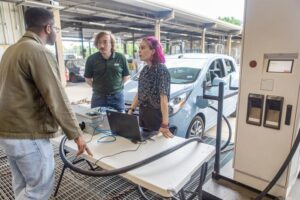More vehicles on British roads than ever
New SMMT data shows 40.7 million vehicles on British roads – the highest figure ever – but electric vehicles and other tech has cut average CO2 emissions.
The Society of Motor Manufacturers and Traders (SMMT) produces ‘Motorparc’ data each year. A ‘parc’ is a recognised term for the number of registered vehicles in a defined geographic region, so the annual figures provide a useful view of the way road use is changing.

This year’s record-breaking figure of 40.7 million is made up of: 35.1 million cars; 4.9 million vans; 615,500 trucks; and 72,800 buses.
Every category has seen an increase except for buses and coaches – which has the lowest numbers since records began. Also, more than a quarter of buses have been in use for at least 15 years. The implication is a need for new investment in public transport.
What’s more, despite the overall increase in vehicles, average CO2 emissions from cars and vans has seen a small decrease of –1.6%. This is down to the new lower and zero-emission models.
Some 1.1 million cars are now fitted with a plug – whether partly or fully electric. Yet this represents just 3.1% of the total.
Things are more positive in commercial vehicles: the numbers of electric vans has increased by 67.3% and coaches by 34.9%. Figures for zero-emission trucks has also increased by nearly three times, though they still account for only one in every 600 trucks.
One factor limiting take-up is the lack of infrastructure needed for electric vehicles. SMMT data also shows just one standard public charger for every 36 electric cars – a decrease from 31 in 2021. There are also no dedicated HGV charging points on the UK’s strategic road network.
As the SMMT observes, a huge difference could be made to levels of CO2 through investment in both electric buses and the infrastructure that supports private use of electric vehicles. It would reduce traffic queues, too.
Mike Hawes, Chief Executive of SMMT, says: ‘We are driving Britain towards a net zero future with more than a million zero emission vehicles now on the road and cutting carbon. With exciting new technologies and models fuelling our appetite to get back behind the wheel, now is the time to commit to greater investment in infrastructure and incentives, to speed up a switch to carbon-free mobility that is accessible to all.’
Of course, many councils are already addressing this issue. Last month, Birmingham announced the installation of the area’s first rapid EV chargers.
Photo by Nik Radzi
















Leave a Reply